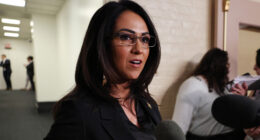Sarah Bloom Raskin was nominated by Biden for a position on the Board of the Federal Reserve. Senate Republicans had already decided to oppose her nomination which meant Democrats couldn’t afford a single defection on their side. But there were hints that Sen. Joe Manchin was not happy with some of her views and today he announced he would not support her. That means here nomination is doomed.
Sarah Bloom Raskin’s nomination to the Federal Reserve Board appeared all but doomed on Monday after Sen. Joe Manchin III, a key Democratic vote, said he opposed her because of her stance on energy in an era of inflation.
“I have carefully reviewed Sarah Bloom Raskin’s qualifications and previous public statements,” Manchin, or West Virginia, said in a statement Monday. “Her previous public statements have failed to satisfactorily address my concerns about the critical importance of financing an all-of-the-above energy policy to meet our nation’s critical energy needs. I have come to the conclusion that I am unable to support her nomination to serve as a member of the Federal Reserve Board.”
Raskin’s nomination to the job of vice chair for supervision — the Fed’s top banking regulator — was already under pressure, with Republicans initially opposing her candidacy over her focus on climate change and its threat to financial stability.
Democrats have blamed Republicans for failing to advance Biden’s Fed nominees at a time when inflation is spiking. But Sen. Pat Toomey, the ranking Republican on the Senate Banking Committee, said he offered to go ahead with every nominee but Raskin.
“Last week, I told Chairman Brown that Republican Committee members would agree to proceed with a markup on all outstanding nominations except that of Sarah Bloom Raskin,” Sen. Patrick J. Toomey (R-Pa.) said in a statement Tuesday, ahead of the meeting, referring to Senate Banking Committee Chairman Sherrod Brown (D-Ohio).
“All senators — not just Banking Republicans — deserve straightforward and honest answers from Ms. Raskin before having to cast a vote on her nomination,” Toomey added. “Her fitness to serve, her judgment and her probity are of utmost importance because Ms. Raskin is being considered for a 10-year term at the nation’s independent central bank and foremost financial regulator. This isn’t a garden-variety political appointment.”
Now it looks like that’s exactly what Democrats will have to accept. But at least for today, the White House is continuing to pledge its support for the nominee.
.@SBloomRaskin is one of the most qualified people to have ever been nominated for the Federal Reserve Board of Governors– she previously served on the Board and she served as second-in-command at Treasury, both positions where she earned bipartisan Senate confirmation.
— chrismeagher46 (@chrismeagher46) March 14, 2022
It seems Manchin’s concern about Raskin may stem from an op-ed she wrote last year arguing that the financial regulation should be viewed in light of climate change. Here’s a sample.
In light of the changing climate’s unpredictable – but clearly intensifying – effects on the economy, US regulators will need to leave their comfort zone and act early before the problem worsens and becomes even more expensive to address.
READ RELATED: Meat Loaf Health: Inside ‘Bat Out Of Hell’ Singer’s Health Conditions – Did Singer Suffer a Stroke Or Covid?
This imperative means two things. First, regulators must move faster in preparing firms within their jurisdiction to weather climate effects that are not being eliminated by markets. Second, they need to ask themselves how their existing instruments can be used to incentivize a rapid, orderly, and just transition away from high-emission and biodiversity-destroying investments…
US regulators need to be encouraged to think more imaginatively about how they can engage with local transition efforts. For example, how might financial policies from diverse agencies be stitched together to produce outcomes that enable firms to hit their net-zero targets? How can financial policy be used to help accelerate a transition that redeploys workers for new jobs, or to assist households that are being asked to change their spending habits? And how can regulatory changes relating to disclosure, access to credit, and pricing of risk support a rapid and just green transition?…
Most of the necessary tools are already there. What is lacking is a willingness to break the habit of acting only after a disaster. Financial regulators must reimagine their own role so that they can play their part in the broader reimagining of the economy.
It’s not exactly clear what that would mean in practice but one thing it could mean is making it more difficult for banks to invest in oil and gas companies. That’s something that probably doesn’t look very appealing to Manchin after the invasion of Ukraine and the surge in oil and gasoline prices. It’s likely why Sen. Manchin’s statement today mentioned her prior history of public statements. He wrote “The Federal Reserve Board is not an institution that should politicize it’s critical decisions…At this historic moment for both the United States and the world at large, it is imperative that the Federal Reserve Board preserve its independence and steers clear of any hint of partisanship.”

In other words, Manchin doesn’t want Raskin to “think more imaginatively” about a “just green transition,” especially not right now. Despite the White House support, the NY Times reports her nomination will likely be withdrawn soon.
“Manchin’s decision is very likely to doom Raskin’s nomination,” Ian Katz, managing director at Capital Alpha Partners, wrote in reaction to the news. “We wouldn’t be surprised if Raskin withdraws in the next week or two — perhaps sooner.”…
“This effectively kills her nomination,” Tobin Marcus at Evercore ISI wrote after the news, adding that it “likely clears the way for Biden’s other Fed nominees — Jay Powell, Lael Brainard, Lisa Cook and Philip Jefferson — to advance and be confirmed.”
So they’ll give this a week or so to save face but unless Manchin changes his mind, her nomination is done. Some activists are clearly not happy with Manchin but what else in new.
BREAKING: Senator Joe Manchin stabs Joe Biden in the back again, announces that he will oppose the president’s nomination of Sarah Bloom Raskin to the Federal Reserve Board — likely dooming her chances for confirmation. RT IF YOU THINK MANCHIN SHOULD BE BOOTED FROM THE PARTY!
— Occupy Democrats (@OccupyDemocrats) March 14, 2022
Source:






